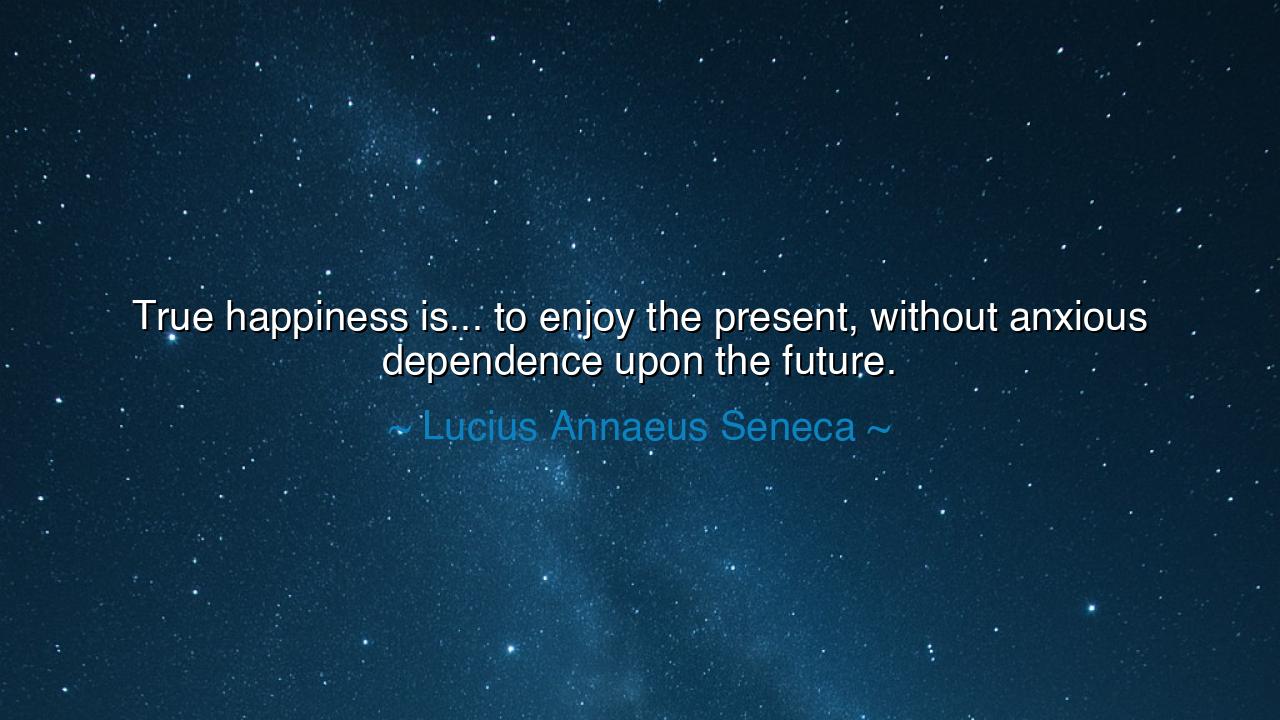
True happiness is... to enjoy the present, without anxious






When Lucius Annaeus Seneca declared, “True happiness is... to enjoy the present, without anxious dependence upon the future,” he imparted a wisdom that echoes across the ages—a wisdom that calls us to liberate ourselves from the chains of constant yearning. In these words lies the essence of a life well-lived: one that is not shackled by the fear of what may come, nor the regret of what has passed, but is rooted firmly in the present moment. Seneca, the Stoic philosopher, understood that happiness is not something to be chased in the far-off future, but to be found in the simple enjoyment of now.
In the realm of the ancients, there was a persistent belief that contentment was not a gift given by fortune, but a skill cultivated through discipline and thought. The great philosopher Epicurus, often misrepresented as a hedonist, taught that true pleasure was not found in indulgence, but in moderation and in the pursuit of peace of mind. Similarly, Seneca echoes this wisdom, reminding us that we are most often enslaved by our own desire for tomorrow. We live in the hope of some better future, while the beauty of today slips unnoticed through our fingers. The present is fleeting, and yet it is all we truly possess.
There is a story of King Croesus, the ancient ruler who sought to understand the meaning of happiness. He asked the sage Solon, “Who is the happiest man you have ever met?” expecting to hear his own name. But Solon, with the wisdom of ages, replied that it was not the wealthy king, but rather a humble man named Tellus, whose life had been marked by simplicity and peace. Croesus was puzzled, so Solon explained that true happiness comes not from possessions or future promises, but from the contentment of living well in the moment, without anxiety over what tomorrow may bring.
Seneca’s words reflect this ancient truth: happiness is found not in striving for some ideal future, but in savoring the present. Too often, we are consumed by the illusion that happiness is something ahead of us, something we can only grasp once we achieve certain goals or obtain specific desires. But the wise know that this dependence on the future steals the joy that is right before us. To be present, to savor each moment, is the truest path to contentment.
Seneca himself, though a man of great wealth and position, was not immune to the temptations of anxious thinking. He, too, battled with the weight of uncertainty. But his philosophy was one of balance—a call to live with intention, to embrace each day, and to focus not on the shifting tides of fortune, but on the enduring strength of the mind. Happiness, as he taught, is not about control over external circumstances, but control over our responses to them. It is the serenity that arises when we let go of the endless chase for things beyond our grasp and live with gratitude for the simple act of breathing, of being.
To enjoy the present without anxious dependence upon the future requires a profound shift in our mindset. We must learn to let go of the illusion that happiness is found in the next promotion, the next relationship, the next success. Instead, it is found in the quiet moments— in a conversation with a loved one, in the beauty of nature, in the stillness of the morning. It is found in the awareness that this moment is enough, that we are enough. In this, Seneca offers us not just advice, but a call to live deliberately.
The lesson, then, is clear: freedom from worry about the future is the gateway to true happiness. Let go of what you cannot control. Do not allow the promise of tomorrow to rob you of the treasure of today. Focus on the present—on what is within your reach, within your power—and you will find peace. Live with purpose, but also with acceptance, knowing that happiness is not a destination, but the journey itself. Live fully now, for the present is all we truly own.






AAdministratorAdministrator
Welcome, honored guests. Please leave a comment, we will respond soon